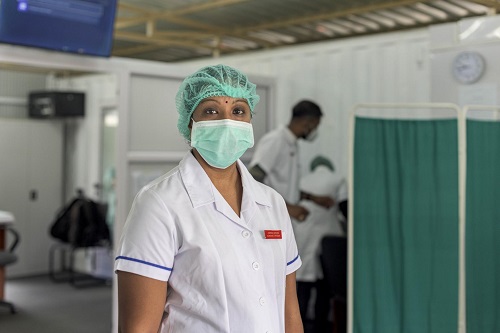International Women's Day 2021
Introduction
International Women's Day celebrates women's achievements. It is also an occasion to rally for women's equality, gender equity and human rights. The theme of this year “Women in leadership: Achieving an equal future in a COVID-19 world” is to recognize the tremendous efforts by women and girls around the world in shaping a more equal future and recovery from the COVID-19 pandemic.
As countries in the African region intensify efforts to control the pandemic, health systems are being challenged. The consequential disruption of services on the already overstretched health systems, and the deviation of resources from essential sexual and reproductive health services (SRH) have increased the vulnerability of African women notably women in remote and rural areas and humanitarian settings.
Reductions in access to and utilization of essential maternal and newborn health (MNH) services during epidemics translate into important increases in the number of women and newborns who suffer complications or die during pregnancy, childbirth and the postnatal period. Even a modest decline of 10% in service coverage during pregnancy and for newborns could result in an additional 28 000 maternal deaths, 168 000 newborn deaths, and millions of unintended pregnancies as family planning services face disruptions.
School closures during the COVID-19 crisis led to another vulnerability for women, exacerbated by, an increase in teenage pregnancy and unintended pregnancies in many countries. Additionally, staying out of school for extended period usually led to greater likelihood of engagement in risky sexual behaviour and increased sexual violence and exploitation. Also, women and girls are increasingly becoming victims in the spike of domestic violence fuelled by economic hardship as millions of people are pushed into extreme poverty.
On the other hand, many women are at the forefront in the fight against COVID-19. In total, the African Region counts more than 770,000 qualified women working in the health sector (doctors, nurses and midwives). They represent about 57% of the health workforce. However, only 28% of them are female doctors. This average is lower than the global average of 40% of female physicians. Hence, the sex distribution of health workers in the African region shows that, although women represent majority of the health workforce, they are often under-represented at senior medical levels.
However, some countries manage to maintain the 50/50 ratio or are getting closer to it. This is the case, for instance, in Benin, Mozambique, Niger, Senegal and South Africa. Others have even managed to reverse the trend with a higher number of female doctors for example, in Zambia, where 18.45% of the doctors are men compared to 81.55% women.
Message of WHO Regional Director for Africa
Message of WHO Regional Director for Africa, Dr Matshidiso Moeti
Message de la Dre Matshidiso Moeti, Directrice régionale de l’OMS pour l’Afrique
Mensagem da Dr.ª Matshidiso Moeti, Directora Regional da OMS para a África
Feature Story

Fewer COVID-19 cases among women in Africa: WHO analysis
Women account for a slightly smaller proportion of COVID-19 infections and deaths compared with men, a preliminary analysis by the World Health Organization (WHO) in 28 African countries shows. The analysis based on COVID-19 gender specific epidemiological data provided by countries found that although women account for around 41% of COVID-19 cases, this ranges from 31% in Niger to over 57% in South Africa. In most countries, women are somewhat less likely to die from COVID-19 than men. For instance, in Cote d’Ivoire the case fatality ratio stands at 0.4% for women compared with 0.5% in men, while in the Democratic Republic of the Congo it is 2.2% versus 2.7% and 0.1% versus 0.5% in Seychelles.


